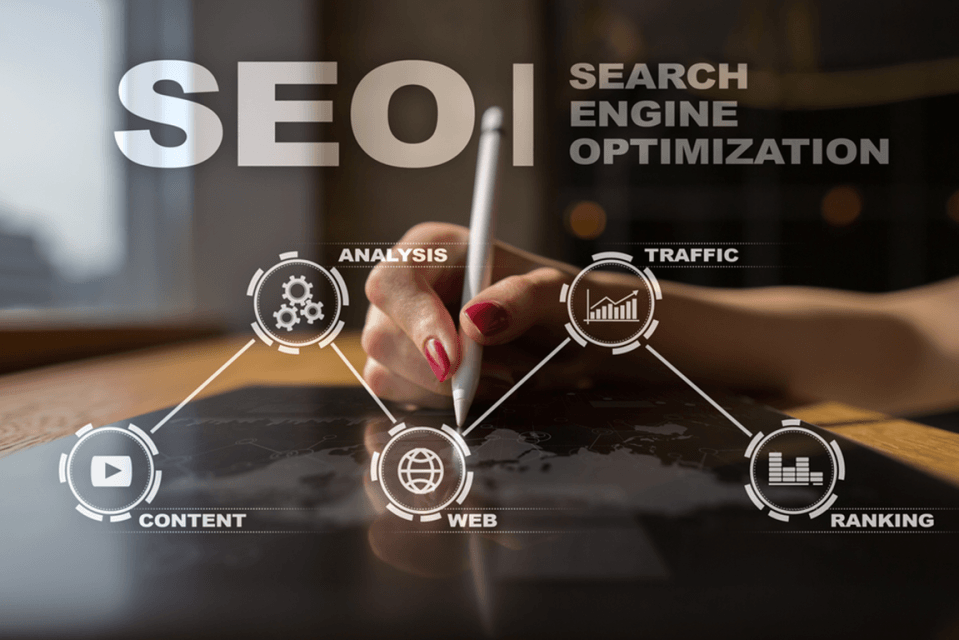What is search engine optimization?
Search engine optimization (SEO) is the art and science of getting pages to rank higher in search engines like Google. Since search is one of the main ways people discover online content, ranking higher in search engines can lead to more traffic to your website.
In Google and other search engines, the results page often displays paid ads at the top of the page, followed by regular results or what search marketers call “Free search results”. Traffic that comes through SEO is referred to as “organic search traffic” to distinguish it from traffic that comes through paid search. Paid search is known as search engine marketing (SEM) or pay-per-click (PPC).
How does Search Engine Optimization work?
Search engines such as Google use an algorithm or set of rules to determine which pages to display for any given query. These algorithms have evolved to become very complex and take into account hundreds or even thousands of different ranking factors to determine their search results rankings.
However, there are three primary metrics that search engines evaluate to determine a site’s quality and how it rank:
Links – Links from other websites play a major role in determining a site’s ranking in Google and other search engines. The reason is that the link can be considered a quality vote from other websites, as website owners are not likely to link to other poor-quality websites.
Sites that get links from many other sites gain authority (called “PageRank” in Google) search engines, especially if the sites they link to are themselves authoritative.
Content – In addition to searching links, search engines also analyze the content of a web page to determine if it is relevant to any particular search query.
A big part of SEO is creating content that targets the keywords that search engine users are searching for.
Page Structure – The third essential component of SEO is page structure. Because web pages are written in HTML, the way the HTML code is structured can affect a search engine’s ability to rate the page.
Including relevant keywords in the title, URL, and page titles, and making sure a site is crawlable are some of the actions site owners can take to improve their site’s SEO.
Search engine optimization involves optimizing each of these basic components of search engine algorithms in order to rank higher in search results.
Why is search engine optimization important?
While paid advertising, social media, and other online platforms can generate traffic to websites, the majority of online traffic is driven by search engines.
SEO is also one of the only online marketing channels that, when set up correctly, can continue to pay dividends over time.
That’s only if you provide solid content that deserves to be ranked first for the right keywords, as your traffic can multiply over time, while advertising needs constant funding to send traffic to your site.
Optimizing your site will help provide better information to search engines so that your content can be indexed and displayed correctly within search results.
Types of Search Engine Optimization
There are four types of SEO you need for a natural search strategy:
- On-page SEO
- Technical SEO
- Off-page SEO
- Local SEO
By breaking down your SEO strategy and thinking into these categories, it will be much easier to organize and implement your SEO strategic plans.
In this article, we’ll look at each type of SEO and how important it is to your overall marketing strategy.
On-Page SEO
On-page SEO is related to the content on your website.
It includes strategies for optimizing a specific page on your site. These factors help search engines understand what the content is about and know that a website is a valuable resource that people want to find.
This type of SEO includes:
Keyword Research: Find the best keywords to target in your page content.
Content Creation: Publish high-quality content focused on targeted keywords.
Keyword optimization: use the target keyword in all the right places and use a good meta tag for SEO.
Technical SEO
This type relates to the non-content elements of your website.
It includes strategies to improve the site’s backend structure and foundation. In Technical SEO, work is done to improve the readability of the site (making it easier for search engines to crawl and understand the site) and provides a good user experience, which helps search engines know that the site is of high quality.
Good user experience is also important to readers and can affect overall traffic and engagement rates.
This type includes:
- Site speed
- Mobile Compatibility
- indexing
- Crawlability
- Site engineering
- structured data
- protection
Off-page SEO
Off-page SEO techniques help in strengthening the impact of your website and its relationship with other websites.
It includes strategies for building the website’s reputation and authority. These factors help search engines see that a website is an ideal search result because it is from a reliable and reputable source.
Most Off-page SEO is about high-quality backlinks.
Local SEO
Local SEO is a search engine optimization (SEO) strategy that will prepare your business to be more visible in local search results on search engines such as Google, Yahoo, or Bing.
If your company has a physical address in a specific geographic area, you can benefit from local SEO.
In conclusion and after knowing what is improving site data on search platforms and its importance, and knowing that searching for sites through search engines such as Google and others is the first steps of daily Internet users. And our technical team can improve and develop the search results of your organization’s website and upgrade it to be among the first search results, based on the fact that the search results in the first three pages are the ones that can get visits and information from those looking for your service or product inside and outside Sudan. Therefore, do not hesitate to contact us if you have any questions or inquiries, we are here at your service.
You can read the article on search engine optimization on Wikipedia here

